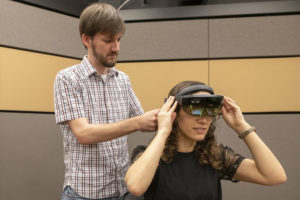Stanford scholar Jeremy Bailenson and other researchers found that people’s interactions with a virtual person in augmented reality, or AR, influenced how they behaved and acted in the physical world.

Mark Miller works with lab manager Talia Weiss to run through the experiment during a testing phase.
For example, people avoided sitting on a chair they had just seen a virtual person sit on. Researchers also found that participants appeared to be influenced by the presence of a virtual person in a similar way they would be if a real person were next to them. These findings are set to publish May 14 in PLOS ONE.
“We’ve discovered that using augmented reality technology can change where you walk, how you turn your head, how well you do on tasks, and how you connect socially with other physical people in the room,” said Bailenson, who co-authored the paper with graduate students Mark Roman Miller, Hanseul Jun and Fernanda Herrera, who are the lead authors.
In recent years, many technology companies have focused on developing augmented reality goggles and other products, shifting away from their previous emphasis on virtual reality, Bailenson said.
To examine how AR affected the way people behaved in social situations, researchers recruited 218 participants and conducted three studies. In the first two experiments, each participant interacted with a virtual avatar named Chris who would sit on a real chair in front of them.
“The fact that not a single one of the subjects with headsets took the seat where the avatar sat was a bit of a surprise,” Bailenson said. “These results highlight how AR content integrates with your physical space, affecting the way you interact with it. The presence of AR content also appears to linger after the goggles are taken off.”
In the third study, researchers examined how AR affects the social connection between two people who are having a conversation while one of them wears an AR headset. Researchers found that those wearing AR goggles reported feeling less socially connected to their conversation partner.
See the full story here: https://news.stanford.edu/2019/05/14/augmented-reality-affects-peoples-behavior-real-world/
Pages
- About Philip Lelyveld
- Mark and Addie Lelyveld Biographies
- Presentations and articles
- Tufts Alumni Bio